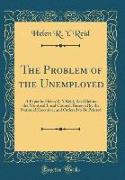The Problem of the Unemployed
BücherAngebote / Angebote:
Excerpt from The Problem of the Unemployed: A Paper by Helen R. Y Reid, Read Before the Montreal Local Council, Received by the National Executive, and Ordered to Be PrintedMigration. Of unemployment includes among 1125 many elements the great problem of rural migration. T hat factors, besides lack of work help to feed the constant stream ofpopulation which hows from city to town is of course admitted. The superior attractions, offered by the town in diversity, conditions and remuneration of employment as well as in social amenities, certainly account for no small portion of the rural exodus, but ifthose on the land had plenty to do and a decent return for doing it, the overgrowth of our towns would speedily' receive a salutary check. In Switzerland rural migration is counter Swiss House acted in some degree by a remarkable system of house industries, which, while in a measure a survival of a primitive form of produc tion, stillplays amostimportant part in the economic life ofthe nation. In the census of 1888 over men and women or 73 per cent. Of the total workers in the trade were engaged in their homes in watch and clock work. Over worked in the same way at embroidery, over at silk, 100 per cent. Of wickerwork was being made in homes 95 percent. Of wood-carving, 70 per cent. Ofmu51calinstru ments etc. The application of technical instruction to the house in dustries has been productive of immense good though doubtless their vitality owes much to the preference of the Swiss workman for his traditional work, to the difficulty of migration and to the strong attachment of the Swiss for their native soil and canton. The general emigration rate of seems very favourable when com pared with the rate for the United Kingdom which was, in 1893, (taking only British and Irish) nearly 6 per 1000. It is natural that a system, of industry so entirely outside the law, involving as it does drawbacks and blemishes in regard to conditions of labor and the employment of women and children, should be looked on with a certain degree of hostility. Then again, because of the lowness of wages earned and the consequent depression of wages in towns, thehouse-industrial system is not in favour with the urban working classes. Ou the other hand there are compensating advantages in the greater freedom enjoyed by the workers and the maintenance of family life, and it seems unquestionable that such home industries as these hand-trades materially alleviate the problem of rural migra tion and consequently the problem of rural and city unemployment, These hand-trades when brought to a high state of excellence by Government, properly regulated with no middlemen or contract makers to crush down the worker under the iron heel of a sweating system would be a source of contentment to many who come now to the cities dissatisfied and out of work, who appeal for work at lower rates than the regular worker and thus displace good men while lowering the wages of all in the trade.About the PublisherForgotten Books publishes hundreds of thousands of rare and classic books. Find more at www.forgottenbooks.comThis book is a reproduction of an important historical work. Forgotten Books uses state-of-the-art technology to digitally reconstruct the work, preserving the original format whilst repairing imperfections present in the aged copy. In rare cases, an imperfection in the original, such as a blemish or missing page, may be replicated in our edition. We do, however, repair the vast majority of imperfections successfully, any imperfections that remain are intentionally left to preserve the state of such historical works.
Folgt in ca. 10 Arbeitstagen
